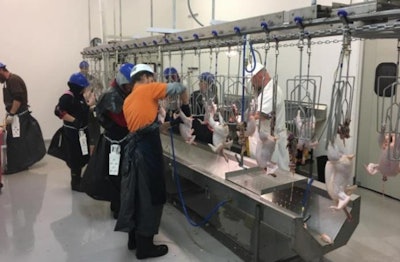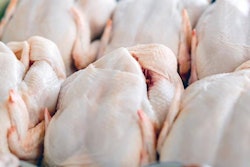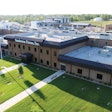
What started as a high school FFA project for Cavan Sullivan has grown into a diversified poultry operation that includes breeding and hatching, production and processing.
Sullivan, along with his wife Sydney, and brother, Steele, operate Sullivan Farms and Petersburg Poultry Processing in Petersburg, Illinois.
Evolution of the business
Sullivan said he had always been fascinated with the hatching of birds, and one particular event during his youth planted the seed that led to the family business.
“When I was 12 years old, my grandpa hit a pheasant hen while he was on a hay mower, and he brought me the eggs. I was always the kid that people would bring duck eggs and goose eggs to when they found a nest. I hatched those out, and that put me on the course to start my pheasant farm,” Sullivan explained. “In ’99 I was in high school and in FFA, I started raising ringneck pheasants as a project to sell birds to dog trainers, clubs and conservation groups.”
Sullivan began hatching and selling pheasant chicks and adult birds. That FFA business project helped Sullivan pay his way through college and set the foundation for the business he has today.

Steele, Sydney, Titus and Cavan Sullivan | Courtesy of Cavan Sullivan
The push to diversify
The pheasant business has grown exponentially since Sullivan’s FFA days, but he said he did not see that business model as sustainable, considering there is an aging population in the pheasant market and the number of related clubs is declining.
“Being that I’m a young guy and I want to continue to do this and be relevant, I don’t want to be like Kodak and lose out,” he said, referring to the camera and film company that failed to capitalize on the industry’s change to digital photography.
Sullivan noted that there was a good supply of people who are looking for processed pheasants.
There was a U.S. Department of Agriculture (USDA)-approved plant in Illinois where Sullivan began taking pheasants for processing, but because the plant was about four hours away and had a processing schedule that wasn’t particularly conducive to having regular family and sleeping hours, Sullivan explored the idea of starting a new plant.
However, the Sullivans realized that a plant to exclusively slaughter and process pheasants would not be financially feasible.
“In order to justify the plant, we had to look at other possibilities of other types of birds that we could also slaughter that there would be a demand for. What we came across was this group of folks raising pastured poultry that were facing similar constraints on the processing side. There’s not a small USDA (plant) available to folks.
“Whether you are raising chickens for your own freezer or 1,000 broilers a week to sell at your local farmers’ market, your limitation is the same that we found,” he said.
Petersburg Poultry Processing
The Sullivans have operated the Petersburg Poultry Processing plant for roughly one year.
The family has diversified its farming operation, as it now raises turkeys for processing in addition to pheasants it processes at the plant. The Sullivans have several internal brands, as well as some it offers to its customers.
Among those brands are Sullivan Pheasant Farm, Sullivan Turkey Farm, and Tamya. Tamya is a halal turkey line, which is third-party certified. Sullivan explains that as needed, his company can call on halal advocates who can send in the appropriate personnel to do the halal slaughter process.
The plant employs about 22 people and slaughtering is done three days a week. While most of the slaughtering operations are focused on pheasants, turkeys and chickens, the Petersburg plant processes waterfowl one day a month.
The plant is also licensed to process rabbits, but none have been processed there to date.
Opportunities involving organic spent hens
One opportunity Petersburg Poultry has pursued is the processing of spent hens from nearby organic egg producers.
Sullivan said he is trying to develop some markets for those birds. The organic layers meet criteria of Global Animal Partnership certification, are raised without the use of antibiotics, and have been fed some of the best organic feeds, Sullivan said. Yet they are not always purchased by buyers looking for that type of poultry product.
“When they’re done laying, a lot of them are going into secondary marketing,” he said. “Why send that organic chicken to a dog food manufacturer who doesn’t care what it is, when you could possibly turn it into a component product when somebody else is making an organic chicken human food?”
“We’re trying to add value so those farmer co-ops can send us their spent hens and get something for them.”
Diverse operation includes breeding and hatching
While the bulk of Sullivan’s hatching operation remains with pheasants, they also hatch other species.
According to Sullivan, about 3,000 breeder pheasants are kept around in a typical breeding cycle, and this includes a wild type of pheasant and lines for meat production. Those breeders can produce about 150,000 eggs. If needed, Sullivan can also source eggs from other suppliers, although he added that not all farms have the type and quality of pheasant that he feels confident putting on his customers’ farms.
The Sullivans also maintains a breeder flock of heritage or standard-bred Delaware chickens, and they are on track to hatch about 75,000 of them this year. Sullivan said they also source eggs from another breeding farm for Cornish rock cross broilers, and they are working on developing their own Cornish Delaware Cross broiler.
The Sullivans’ turkeys are often bought as poults from larger integrators and placed on their grow-out farms. The family is expecting to produce four cycles of turkeys, with each cycle amounting to about 5,000 birds. Because the amount of incubator space needed for turkey eggs is much larger than it is for pheasants, and the two species’ primary hatching seasons coincide, few turkey eggs are hatched in incubators.
The farm also hatches quails and partridges, but those eggs are all purchased from other breeders.


















